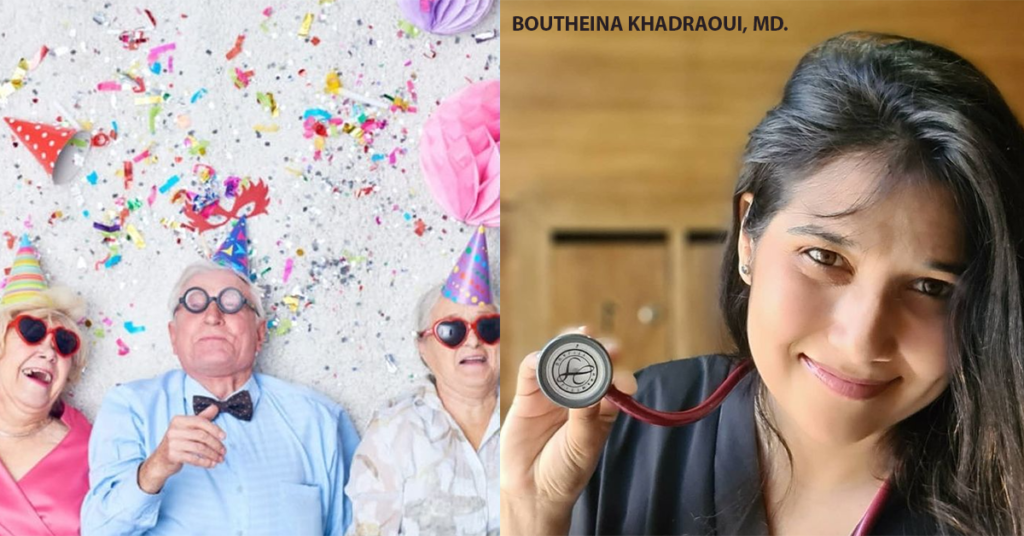New York, USA
MP: How Do You Introduce Dr. Boutheïna To the Readers?
I’m Dr. Boutheïna Khadraoui a Geriatrician gerontologist. I did my medical studies at the Faculty of Medicine and Pharmacy of Casablanca and then at the Faculty of Medicine Pierre and Marie Curie in Paris, and I have been practicing this new discipline since a few years ago in Morocco.
MP: What Is Geriatric Medicine?
Geriatrics, or geriatric medicine, is a specialty that focuses on the health care of elderly people. It aims to promote health by preventing and treating diseases and disabilities in older adults.
MP: Why Did You Choose Your Field of Specialty?
Becoming a doctor was my childhood dream. I always used to hear that Medicine was a difficult and challenging field and that dealing with human lives is not easy. This made me further think to choose this formidable field, and I stepped in and got admitted to my University. Due to my natural tendency and inclination towards accepting hard things, I started to get associated with this field, and with time I realized this was the ultimate challenge of saving and dealing with human lives for which I was looking for. The answer was clear to me “Medicine was in my blood”.
MP: Which Maladies Commonly Appear Among Geriatric People?
The most common chronic diseases in the elderly are:
- According to the American Society of Consultant Pharmacists Adult
- Diabetes
- Arthritis
- Kidney and bladder problems
- Dementia
- Parkinson’s disease
- Glaucoma
- Lung diseases
- Cataracts
- Osteoporosis
- Enlarged prostate
- Alzheimer’s disease
- Macular degeneration
- The Depression
- Heart disease
MP: What Is the Best Part of Your Job?
I love being a doctor for so many reasons. First of all, it is an honor to be trusted with another human being’s health and well-being. Another reason why I love medicine is that it is a profession in which people continue to learn and grow. Lastly, I feel like I am making a positive contribution to my community and society. By training future doctors and providing good medical care to my patients, I feel like I have the opportunity to have an impact on others. For me, this is a key aspect of happiness and fulfillment in life.
MP: At What Age Should a Person See a Geriatric Doctor?
Geriatrics is not only defined by the age of the patients. However, it most often concerns those over 65, and the main challenges of this specialty target those over 80.
MP: What Advice Would You Give to a Medical Student Interested in Your Specialty?
Career choice is both an important and inevitable milestone in the life of each medical student. So what I would tell a medical student interested in the geriatric specialty to do is to explore himself, research about the specialty, and engage in clinical experiences.
MP: Do You Have Any Plans Teaching Your Specialty at Moroccan Medical Schools?
Geriatrics is a new specialty; it has just been recognized in European countries as an entirely separate specialty, contrary to morocco, but I would be more than happy to introduce and teach this new specialty to our future Geriatrics.
MP: What is your daily routine?
I love waking up for early morning workouts, but first I prefer waking up before the rest of my family, making a cup of coffee, and sitting in my backyard. During this time, I say out loud 5 things that I am thankful for. It’s simple, but this kicks off my day with positive energy and a grateful heart, which I think is so essential right now. I like also starting my day with intention, and meditating helps me center my focus on what I want to accomplish in my business, personal life, health, and relationships.
MP: What new medical practices or procedures do you foresee in the future treatment of geriatric patients?
In the society of longevity, the challenge of geriatrics is to help us stay independent and in good health as long as possible. Created and recognized recently, geriatrics is struggling to recruit enough talent to meet the needs of the population.
Geriatrics is an essential specialty for adapting society to aging. The discipline must find ways to recruit more physicians, replace retirements and respond to the foreseeable growth in the number of new patients. Understanding the role and specificities of the geriatrician by the general public can help in its expansion. Other devices such as telemedicine can also facilitate access to geriatricians, despite the current lack of professionals.
MP: What is the Last Thing You Want to Tell Every Med Student?
The studies of medicine, known to be difficult, require a significant and regular investment. Thus, adopting a lifestyle following the requirements of this medical discipline is essential to give yourself the best chances.
My 6 main tips:
- Establish regularity throughout the first year of medicine.
- Take breaks to keep up.
- Organize well to be more efficient.
- Believe in your chances of success.
- Anticipate the start of the school year and its prerequisites.
- Stay focused on your goal.

